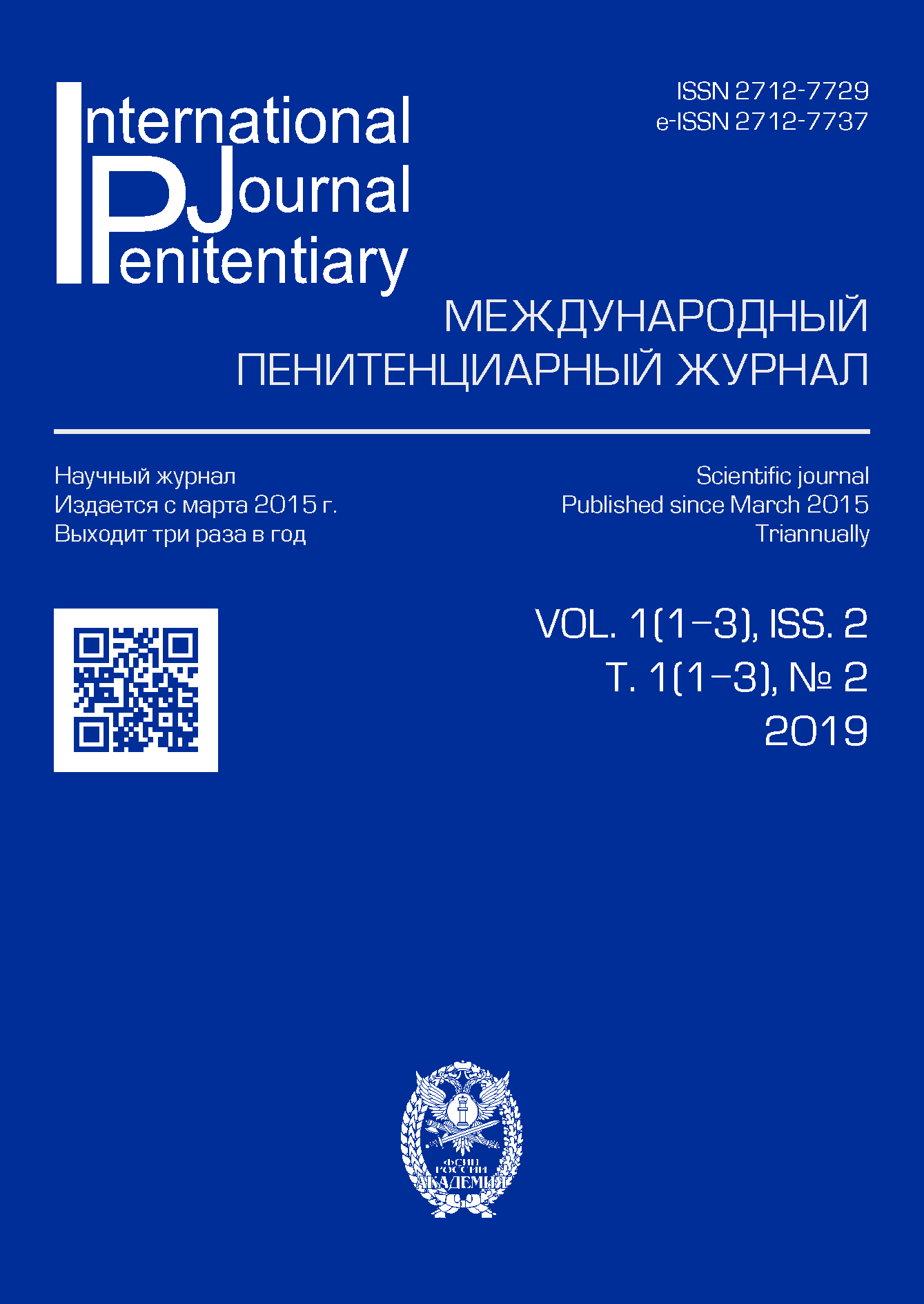Minsk, Belarus
Yaroslavl', Russian Federation
employee
Ryazan', Russian Federation
CSCSTI 10.83
The article is devoted to the problem of developing tests for predicting escapes of convicts, suspects and accused from pre-trial detention centers, prisons and correctional institutions, as well as the algorithm of their implementation in the automated workplace of a penitentiary psychologist. In the overall picture of penitentiary crime, the problem of escapes of convicts, suspects and accused is actual and important. The analysis of literary sources shows that in case of escapes prediction, it is necessary to consider not only criminal, but also social, biological and psychological features of convict’s personality. The psychological determinants of convicts’ escape activity include: emotional instability, conformity, increased anxiety, aggressiveness, rigidity of thinking, pessimism, suspicion, difficult process of adaptation to the conditions of serving punishment; low level of intelligence, presence of negative mental states, expressed motivation to evade serving punishment, an irresistible desire to be free, a desire to protect themselves from physical or psychological impact, active illegal activity in criminal communities. However, identification of the above qualities in convicts, suspects and accused does not allow calculating the probability of their escapes qualitatively. In order to develop psychodiagnostic tools to predict the convicts’, suspects’ and accused persons’ escape probability in terms of predictive validity, the use of “empirical-inductive” strategy of test construction is more effective. As part of this strategy, the scales of escape prediction of convicts, suspects and accused persons in the automated workplace of a penitentiary psychologist, using the psychodiagnostic system “Psychometric Expert”, were implemented. Two scales “Escape 365” and “Escape 90” were added to the method of accentuation research (G. Smishek, K. Leongard). In the method “Comprehensive study of the personality of a convict” – CSPC (E. A. Chebalova) scale “Escape 540” was added. In the method “Abbreviated multifactorial questionnaire for personality research” − Mini-mult (V. P. Zaytsev) scales “Escape 365” and “Escape 180” were added. The analysis of the practice of using predicting scales, implemented in the automated workplace of a penitentiary psychologist, shows that they are additional tools for escapes prevention.
escape, convicts, automated workplace of penitentiary psychologist, prediction, tests.
1. Official website of the FPS of Russia, viewed 25 August 2018, http://fsin.su/statistics/ (accessed date: 25. 08. 2018).
2. Antonyan, Yu. M. 1982, The personality study of the offender, All-Union Research Institute of the MIA of the USSR, Moscow.
3. Debol’skiy, M. G. & Krotova, D. N. 2013, ‘Prevention of risk factors of penitentiary crimes’, Psychology and law, iss. 3, pp. 55-65.
4. Barabanov, N. P. 2003, Organization of activities of correctional institutions for the prevention and suppression of riots, hostage-taking, escapes, RLA of the Ministry of Justice of Russia, Ryazan.
5. Pirozhkov, V. F. 2001, Criminal psychology, Os’-89 Publ., Moscow.
6. Starkov, O. V. 1997, Criminology-penology, Ufa law Institute, Ufa.
7. Debol’skiy, M. G. & Matveeva I. A. 2004, ‘Psychological causes and prevention of escapes of convicts’, Electronic Library of the Moscow City University of Psychology and Education, viewed 27 August 2015, http://psychlib.ru/mgppu/Por-2004/Por-2004.htm#$p110.
8. Gernet, M. N. 1925, In prison. Essays on prison psychology, Law and life Publ., Moscow.
9. Markov, A. Ya., Volobuev, A. N. & Galkin, E. B. 1982, ‘Social and psychological characteristics of persons who escaped from correctional labor institutions’, in Sociological and socio-psychological problems of serving sentences in correctional labor institutions: collection of scientific papers, All-Union Research Institute of the MIA of the USSR, iss. 60, pp. 93−100.
10. Shcherba, S. P. & Pertsova, L. V. 1993, Escapes from educational and labor colonies, Scientific Research Institute of the MIA of Russia, Moscow.
11. Gavriloy, V. M. 2007, Criminological measures to prevent escapes from correctional colonies: PhD thesis (Law), RLA of the Ministry of Justice of Russia, Ryazan.
12. Psychological prevention of convicts escapes in colonies-settlements 2008, The FPS of Russia, Moscow.
13. Alaukhanov, E. O. 1998, Criminology and crime prevention. Special part, Law Institute of the Russian Interior Ministry, Moscow.
14. Ashkov, A. E. 2006, ‘Personality traits of convicts in correctional colonies, prone to escape’, in Bulletin of the Voronezh College of the FPS of Russia: collection of scientific papers, iss. 4, pp. 14−17, Nauchnaya kniga Publ., Voronezh.
15. Piyukova, S. S. 2014, ‘Psychological aspects of escapes prevention of convicts from prison’, Penal system: law, economics, management, iss. 2, pp. 12−14.
16. Khokhryakov, G. F. & Kudryavtsev, V. N. (ed.) 1999, Criminology, Jurist Publ., Moscow.
17. Senkevich, V. V. 2009, Prevention of prison escapes: a personality-oriented approach: PhD thesis (Law), Academy of the FPS of Russia, Ryazan.
18. Shmelev, A. G. 2013, Practical testology. Testing in education, applied psychology and personnel management, Maska Publ., Moscow.
19. Burlachuk, L. F. 2008, Dictionary-reference book on psychodiagnostics, 3rd edn, Piter Publ., St. Petersburg.
20. Fetiskin, N. P., Kozlov, V. V. & Manuylov, G. M. 2002, Social and psychological diagnostics of personality development and small groups, Institute of psychotherapy, Moscow.












